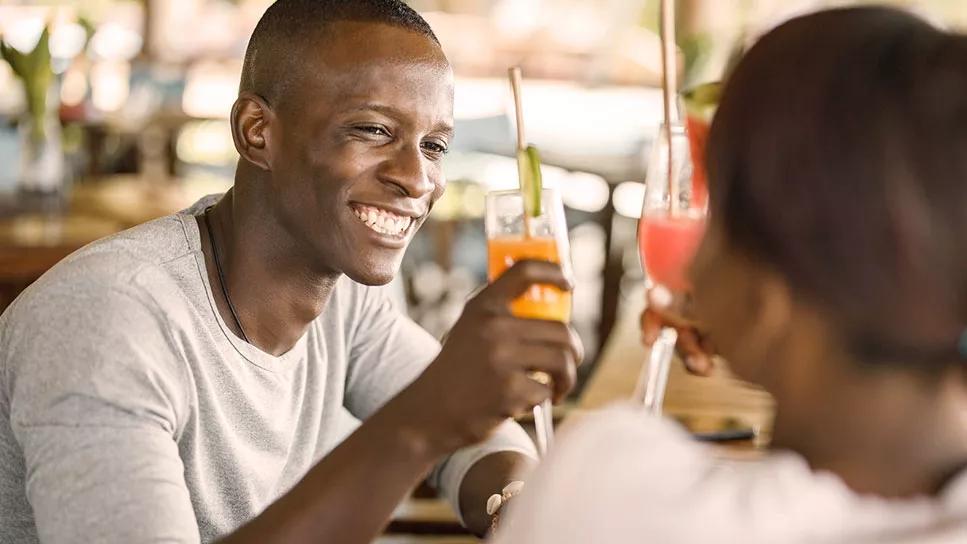Drinking during the day can result in drinking more than usual and worsen your sleep cycle

Image content: This image is available to view online.
View image online (https://assets.clevelandclinic.org/transform/3998b430-ea01-4df3-bb0e-461593fb211f/couple-drinking-bar-1679784930)
Couple enjoying mixed drinks during the day in a bar
When you think of grabbing a drink, you probably envision a low-lit bar or a late-night dinner. But have you ever tried (or been invited) to day drink? If so, you may have noticed that something about it makes you feel … a bit off.
Advertisement
Cleveland Clinic is a non-profit academic medical center. Advertising on our site helps support our mission. We do not endorse non-Cleveland Clinic products or services. Policy
Whether it’s the early-evening hangover or your body simply not being used to a midday buzz, you may feel some differences in how you react to alcohol during earlier parts of the day.
Addiction psychiatrist Akhil Anand, MD, breaks down why day drinking can feel different — and how it can impact your health.
Day drinking can sometimes be a part of social gatherings. Whether it’s a Fourth of July barbecue, grabbing a beer at the St. Patrick’s Day parade or tailgating with friends before the big football game, it’s clear that alcohol isn’t always reserved for after-hours.
But as Dr. Anand points out, there are certain risks to drinking during the day. Here are some things to know before toasting before 5 p.m.
While drinking in the evening usually has a “natural” end, day drinking leaves it open-ended. This increases the risk of overdoing it. Dr. Anand says that if you start drinking earlier in the day, it’s more likely you’ll drink more. You may also feel more peer pressure when participating in day drinking if it’s associated with a celebration of some kind.
You may think that drinking earlier may give your body time to filter through the alcohol before your head hits the pillow. But in fact, day drinking can do just as much harm to your sleep schedule as drinking in the evening.
Advertisement
Drinking during the day can disrupt sleep cycles due to how your circadian rhythm works. “Your sleep cycle follows the sun pattern of the day,” explains Dr. Anand. “Day drinking can cause someone to feel sedated and go to sleep too early.” This can cause sleep disruptions in the middle of the night, causing you to wake up either too early or too late. And so the cycle continues.
You may have heard that drinking can cause your anxiety to increase the day after. Day drinking can cause the same symptoms, but instead of hitting you the morning after, the anxious feelings may start the same day.
Plus, as alcohol is a depressant, it’ll bring you down as intensely as it will bring you up. Also, don’t think that you’ll feel more energetic during the day versus drinking at night — you’ll still feel just as drunk no matter what time it is.
Don’t forget that there are other factors impacting your well-being while you drink. Especially if the sun is beating down during an outdoor event, your body is at a higher risk for dehydration when you drink during the day.
Having a mimosa with brunch is one thing, but as Dr. Anand explains, you should be careful when it comes to any kind of alcoholic beverage first thing in the morning. Once in a while is fine, but if you start needing a drink as soon as you start the day, it may be a sign of addiction.
And if you find that your day drinking is inching earlier and earlier into the day and if it’s becoming a common occurrence instead of an occasional celebration, you may want to consult a healthcare provider.
If you do decide to partake in a drink or two during daytime celebrations, it’s still important to stay safe and be mindful of your health.
Here are some safe drinking habits to practice:
Advertisement
Remember that you should never feel pressured to drink during the day if you don’t want to. Depending on your own health, preferences and comfort level, you might decide to forgo that glass of wine or beer with friends if it feels too early for you, which is totally OK! In fact, there are a variety of nonalcoholic options you can enjoy while still celebrating a daytime event. These are also great options to turn to after you’ve had a drink or two, to help ensure you don’t overdo it when the festivities continue.
Advertisement

Sign up for our Health Essentials emails for expert guidance on nutrition, fitness, sleep, skin care and more.
Learn more about our editorial process.
Advertisement
Your tolerance decreases with age, thanks to body changes, health conditions and medications you may take
‘Blackout rage gallons’ can lead to dangerous levels of alcohol consumption
An enzyme deficiency or rosacea are potential causes of alcohol flush
ACV may help lower blood sugar and calm acid reflux, but don’t believe all the hype
Yes, grabbing a few beers or a couple of glasses of wine or cocktails with friends can increase your heart rate — dangerously in some cases
Drinking alcohol is known to raise your risk of various types of cancer
Forget the myth and answer nature’s call when your bladder feels full
Alcohol provides empty calories, heightens cravings and may slow down your metabolism
Prioritize your health by managing stress, strengthening your social connections and getting quality sleep
Bolsters, blankets, pillows and blocks can offer extra support, stability and comfort
Allergies, postnasal drip, asthma or reflux could be to blame for a cough that won’t quit